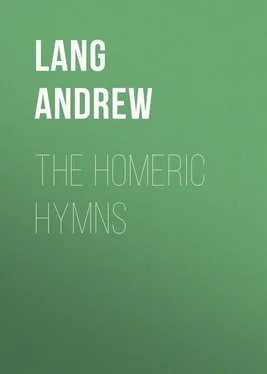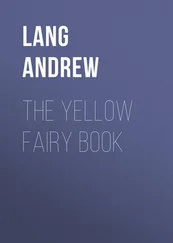Andrew Lang - The Homeric Hymns
Здесь есть возможность читать онлайн «Andrew Lang - The Homeric Hymns» — ознакомительный отрывок электронной книги совершенно бесплатно, а после прочтения отрывка купить полную версию. В некоторых случаях можно слушать аудио, скачать через торрент в формате fb2 и присутствует краткое содержание. Жанр: foreign_antique, foreign_prose, на английском языке. Описание произведения, (предисловие) а так же отзывы посетителей доступны на портале библиотеки ЛибКат.
- Название:The Homeric Hymns
- Автор:
- Жанр:
- Год:неизвестен
- ISBN:нет данных
- Рейтинг книги:4 / 5. Голосов: 1
-
Избранное:Добавить в избранное
- Отзывы:
-
Ваша оценка:
- 80
- 1
- 2
- 3
- 4
- 5
The Homeric Hymns: краткое содержание, описание и аннотация
Предлагаем к чтению аннотацию, описание, краткое содержание или предисловие (зависит от того, что написал сам автор книги «The Homeric Hymns»). Если вы не нашли необходимую информацию о книге — напишите в комментариях, мы постараемся отыскать её.
The Homeric Hymns — читать онлайн ознакомительный отрывок
Ниже представлен текст книги, разбитый по страницам. Система сохранения места последней прочитанной страницы, позволяет с удобством читать онлайн бесплатно книгу «The Homeric Hymns», без необходимости каждый раз заново искать на чём Вы остановились. Поставьте закладку, и сможете в любой момент перейти на страницу, на которой закончили чтение.
Интервал:
Закладка:
Turning to Gemoll, we find him maintaining that the two parts were in ancient times regarded as one hymn in the age of Aristophanes. 5 5 Die Homerischen Hymnen , p. 116 (1886).
If so, we can only reply, if we agree with Baumeister, that in the age of Aristophanes, or earlier, there was a plentiful lack of critical discrimination. As to Baumeister’s theory that the second part is Hesiodic, Gemoll finds a Hesiodic reminiscence in the first part (line 121), while there are Homeric reminiscences in the second part.
Thus do the learned differ among themselves, and an ordinary reader feels tempted to rely on his own literary taste.
According to that criterion, I think we probably have in the Hymn the work of a good poet, in the early part; and in the latter part, or second Hymn, the work of a bad poet, selecting unmanageable passages of myth, and handling them pedantically and ill. At all events we have here work visibly third rate, which cannot be said, in my poor opinion, about the immense mass of the Iliad and Odyssey. The great Alexandrian critics did not use the Hymns as illustrative material in their discussion of Homer. Their instinct was correct, and we must not start the consideration of the Homeric question from these much neglected pieces. We must not study obscurum per obscurius . The genius of the Epic soars high above such myths as those about Pytho, Typhaon, and the Apollo who is alternately a dolphin and a meteor: soars high above pedantry and bad etymology. In the Epics we breathe a purer air.
Descending, as it did, from the mythology of savages, the mythic store of Greece was rich in legends such as we find among the lowest races. Homer usually ignores them: Hesiod and the authors of the Hymns are less noble in their selections.
For this reason and for many others, we regard the Hymns, on the whole, as post-Homeric, while their collector, by inserting the Hymn to Ares, shows little proof of discrimination. Only the methods of modern German scholars, such as Wilamowitz Möllendorf, and of Englishmen like Mr. Walter Leaf, can find in the Epics marks of such confusion, dislocation, and interpolations as confront us in the Hymn to Apollo. (I may refer to my work, “Homer and the Epic,” for a defence of the unity of Iliad and Odyssey.) For example, Mr. Verrall certainly makes it highly probable that the Pythian Hymn, at least in its concluding words of the God, is not earlier than the sixth century. But no proof of anything like this force is brought against the antiquity of the Iliad or Odyssey.
As to the myths in the Hymns, I would naturally study them from the standpoint of anthropology, and in the light of comparison of the legends of much more backward peoples than the Greeks. But that light at present is for me broken and confused.
I have been led to conclusions varying from those of such students as Mr. Tylor and Mr. Spencer, and these conclusions should be stated, before they are applied to the Myth of Apollo. I am not inclined, like them, to accept “Animism,” or “The Ghost Theory,” as the master-key to the origin of religion, though Animism is a great tributary stream. To myself it now appears that among the lowest known races we find present a fluid mass of beliefs both high and low, from the belief in a moral creative being, a judge of men, to the pettiest fable which envisages him as a medicine-man, or even as a beast or bird. In my opinion the higher belief may very well be the earlier. While I can discern the processes by which the lower myths were evolved, and were attached to a worthier pre-existing creed, I cannot see how, if the lower faiths came first, the higher faith was ever evolved out of them by very backward savages.
On the other side, in the case of Australia, Mr. Tylor writes: “For a long time after Captain Cook’s visit, the information as to native religious ideas is of the scantiest.” This was inevitable, for our information has only been obtained with the utmost difficulty, and under promises of secrecy, by later inquirers who had entirely won the confidence of the natives, and had been initiated into their Mysteries. Mr. Tylor goes on in the same sentence: “But, since the period of European colonists and missionaries, a crowd of alleged native names for the Supreme Deity and a great Evil Deity have been recorded, which, if really of native origin, would show the despised black fellow as in possession of theological generalisations as to the formation and conservation of the universe, and the nature of good and evil, comparable with those of his white supplanter in the land.” 6 6 Journal Anthrop. Inst ., Feb. 1892, p. 290.
Mr. Tylor then proceeds to argue that these ideas have been borrowed from missionaries. I have tried to reply to this argument by proving, for example, that the name of Baiame, one of these deities, could not have been borrowed (as Mr. Tylor seems inclined to hold) from a missionary tract published sixteen years after we first hear of Baiame, who, again, was certainly dominant before the arrival of missionaries. I have adduced other arguments of the same tendency, and I will add that the earliest English explorers and missionaries in Virginia and New England (1586-1622) report from America beliefs absolutely parallel in many ways to the creeds now reported from Australia. Among these notions are “ideas of moral judgment and retribution after death,” which in Australia Mr. Tylor marks as “imported.” 7 7 ( Op. cit ., p. 296.) See “Are Savage Gods Borrowed from Missionaries?” ( Nineteenth Century , January 1899).
In my opinion the certainty that the beliefs in America were not imported, is another strong argument for their native character, when they are found with such striking resemblances among the very undeveloped savages of Australia.
Savages, Mr. Hartland says in a censure of my theory, are “guiltless” of Christian teaching. 8 8 Hartland, “Folk-Lore,” ix. 4, 312; x. I, p. 51.
If Mr. Hartland is right, Mr. Tylor is wrong; the ideas, whatever else they are, are unimported, yet, teste Mr. Tylor, the ideas are comparable with those of the black man’s white supplanters. I would scarcely go so far. If we take, however, the best ideas attributed to the blacks, and hold them disengaged from the accretion of puerile fables with which they are overrun, then there are discovered notions of high religious value, undeniably analogous to some Christian dogmas. But the sanction of the Australian gods is as powerfully lent to silly, or cruel, or needless ritual, as to some moral ideas of weight and merit. In brief, as far as I am able to see, all sorts of ideas, the lowest and the highest, are held at once confusedly by savages, and the same confusion survives in ancient Greek belief. As far back as we can trace him, man had a wealth of religious and mythical conceptions to choose from, and different peoples, as they advanced in civilisation, gave special prominence to different elements in the primal stock of beliefs. The choice of Israel was unique: Greece retained far more of the lower ancient ideas, but gave to them a beauty of grace and form which is found among no other race.
If this view be admitted for the moment, and for the argument’s sake, we may ask how it applies to the myths of Apollo. Among the ideas which even now prevail among the backward peoples still in the neolithic stage of culture, we may select a few conceptions. There is the conception of a great primal anthropomorphic Being, who was in the beginning, or, at least, about whose beginning legend is silent. He made all things, he existed on earth (in some cases), teaching men the arts of life and rules of conduct, social and moral. In those instances he retired from earth, and now dwells on high, still concerned with the behaviour of the tribes.
Читать дальшеИнтервал:
Закладка:
Похожие книги на «The Homeric Hymns»
Представляем Вашему вниманию похожие книги на «The Homeric Hymns» списком для выбора. Мы отобрали схожую по названию и смыслу литературу в надежде предоставить читателям больше вариантов отыскать новые, интересные, ещё непрочитанные произведения.
Обсуждение, отзывы о книге «The Homeric Hymns» и просто собственные мнения читателей. Оставьте ваши комментарии, напишите, что Вы думаете о произведении, его смысле или главных героях. Укажите что конкретно понравилось, а что нет, и почему Вы так считаете.












